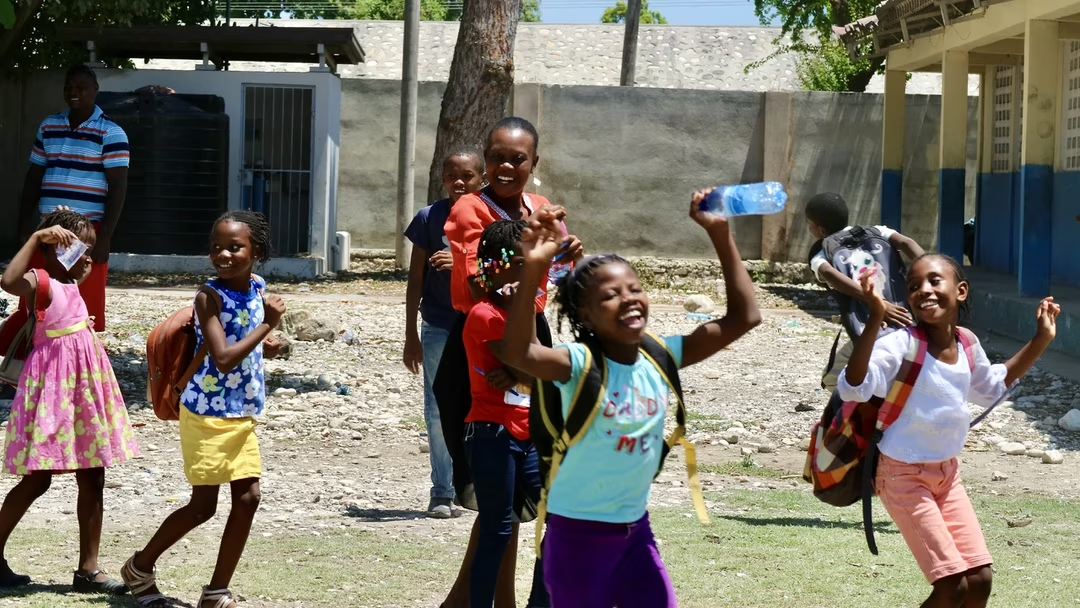Since childhood, I have always heard that Haiti is an underdeveloped country. As I grew up, I kept hearing that over and over. But no political actors or the social class have ever done anything to change that discourse. All people from all backgrounds, all authorities, in the city and outside the city, Haitians living in Haiti or abroad, have the same speech, which makes it seem as though we are OK with this situation and we like it this way, and we’ve decided, finally, to accept this as our fate.
But still the people who live in countries we call developed are just like us, which means that it’s God who created the Chinese, the Americans, the Germans to name just a few. This same God created the Haitians as well. He does not love the other nations more than He loves us. He does not give one nation something more or less. The intelligence quotient (IQ) the Chinese were born with is no different from that of the Haitians. But, one thing that makes the difference is the level of support because our environment has a great influence on our development. The environment we are exposed to will build our capacity to become productive citizens who will be useful to our country.
Everything that a person is comes from education. When I say education, I am not just talking about learning how to read and write, it is deeper than that. It’s about developing the student’s critical thinking, creativity, innovative spirit, problem solving skills, patriotism, to name just a few. And it's because our educational system has been reduced to a school system that after high school graduation, young people are unable to meet their needs, let alone their country’s needs. In the book titled change-toi toi-même et change ton pays (change yourself and change your country), of Mr. Henri M. Dorleans Chapter XVIII ends with the following statement: “it is not because the countries are rich and developed that they put their citizens in a creative and innovative environment through education, it is rather because they choose to create and innovate through education that they became wealthy and developed.”
In Haiti, we are so limited and narrow-minded that even the children are limited in the games they play. Everything that the children are doing that could contribute to their development, parents, teachers, principals, elder siblings, the people around them prevent them from doing it claiming that they are protecting them. They even classify the games as girls’ and boys’ games. We are replacing God, which is the ultimate protector in assuming that we are protecting the children. When the child walks fast, we tell them not to. When they run, we tell them it is very dangerous without realizing that this contributes to their physical development and facilitates their balance.
It is important for all players involved in children's education to know how children develop in order to better support them, so they do not prohibit them from doing what is essential for them, to not mistreat them instead of providing the help they need. If all the players understand this fact and support the children the way it should be done, we will have a developed society where all Haitians will be able to create, produce instead of waiting to consume.
How does child development occur?
Child development occurs in several areas that are connected to each other, such as: physical, linguistic, cognitive and socio-affective. There are many psychologists who write about child development. But, whenever I get the chance to talk about this issue, I like to consider the writings of Erick Homburger Erikson and psychologist Jean Piaget. Author of theories of psychosocial and cognitive development. We will look at these areas one by one in order to answer this question.
Physical area
A few days after the birth of a child, their parents and loved ones may notice an increase in body size, which means that the baby gains more weight, they are getting big and have become longer. Physical development is a process that depends on several factors, including genetic factors (if the child comes from a family with short or tall people), nutritional factors (i.e. the way the child is fed contributes to their physical development) and environmental factors that have to do with the people who help them with movement or exercise.
Linguistic area
It is a slow process and it requires parental understanding because the words are not often clear and understandable. Depending on the environment in which the child is developing, they can begin to pronounce their first words from the first 6 months, and will gradually try to combine several words until they make simple to complex sentences. It is important for the parent to converse often with the children, tell them stories and take some time to listen to them.
Cognitive area
The cognitive development psychologist Jean Piaget talks about 4 stages of cognitive development, which are sensorimotor, preoperational, concrete operational and formal operational stages. Here's what I would like to point out, cognitive development is the set of mental processes that is related to knowledge and impacts memory, language, reasoning, learning, intelligence, problem solving, decision making and attention. It is these capabilities of the brain that allow a child to interact with their environment. The cognitive areas are essential for the development of their skills, children need good support to face the challenges they encounter during this process, so that they do build a habit of giving up when faced with challenges, so that they know it’s through failure that success will come.
Socio-affective area
In this area, Eric Homburger Erikson talks about 8 stages of development, based on personality development, socialization process, and individual work to build identity. Each stage develops the steps that each person goes through in life where they face a threat or a crisis that must be resolved to allow their evolution and personality change. Of the 8 stages, we are considering the first 4 that cover child development.
Stage 1: Trust vs. Mistrust (0-18 months)
Children learn to trust or not to trust others. This trust is related to attachment and expectations that others will meet their needs. A baby depends totally on parents; therefore, the development of trust is based on the ability of their caregivers to care for them.
If their parents create an environment where affection and trust prevail, they will also have the same behavior with other people. But if the baby's needs are not met, they will learn not to rely on people and the development of mistrust will produce frustration, doubt and indifference in the environment.
Stage 2: Autonomy vs. Shame (18 months-3 years old)
At this stage, the child begins to have control over their body. This allows them to develop autonomy as they begin to be able to do some things on their own. Children who successfully go through this stage often believe in themselves. Those who do not successfully go through this stage will develop shame and doubt.
Stage 3: Initiative vs. Guilt (3-5 years old)
Children at this stage begin to develop their power and control of the world through play. They start social interaction, they take initiative on their own, and are willing to work with other children. Children who go through this stage successfully feel that they can lead others. However, those who fail develop a feeling of guilt, doubt and lack of initiative.
NB: The child may still develop guilt, in that they are capable of recognizing their mistakes/when they’ve done wrong, which is normal. In this context, they may develop fear, be unable to take initiative, afraid to face challenges and they always feel guilty. It is not beneficial at all for a child who is developing.
Stage 4: Industry vs. Inferiority (5-13 years old)
At this stage, the child begins to perform difficult tasks, their brain begins to mature, which allows them to begin to imagine, they recognize their strengths and weaknesses and have confidence in their abilities. If they cannot act as well as they wish, then feelings of inferiority will step in. If they do not find support to manage this emotional feeling, they will choose to give up anything that is difficult out of fear of experiencing this situation again.
We notice that stage 4 of Erikson’s theory is related to the cognitive area, they talk about the work the brain is doing to make the child industrious and creative. When we consider the time period (age), it is the age when the child is being taught and is learning things, from first to third grade, the child needs adequate support to allow them to develop well. It is essential to support the children at every stage of their lives if we want to have a developed country, let them be free, do not make things easy for them, allow them to face challenges. Let them know that they may fail but the important thing is to continue until they succeed.

